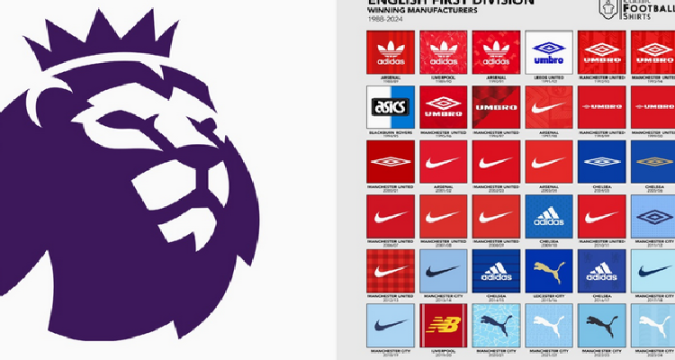
The English Premier League (EPL) is not only the most-watched football league globally but also a massive commercial entity driven by lucrative sponsorship deals. These partnerships significantly influence the league’s financial landscape, enhance club revenues, and shape the overall brand identity of the competition. Sponsorship in the EPL has evolved into a sophisticated ecosystem where corporate interests intersect with the passion of football fans. Understanding how these sponsorship deals work and their implications provides insight into the strategic decisions that drive the league’s success.
The Sponsorship Ecosystem
The sponsorship landscape within the Premier League is vast and multifaceted. It includes various categories, such as shirt sponsorship, stadium naming rights, and official league partnerships. The league’s visibility and popularity make it an attractive platform for brands looking to enhance their reach. The EPL’s matches are broadcast in over 200 countries, drawing in a global audience that exceeds 3 billion viewers annually. This extensive exposure is a key factor that attracts sponsors ranging from multinational corporations to local businesses.
At the club level, shirt sponsorships have become a primary source of revenue. In recent years, the financial stakes of these deals have escalated dramatically. For example, Manchester City’s partnership with Etihad Airways, reportedly worth around £67.5 million per year, exemplifies how clubs are leveraging their brand power to attract substantial financial backing. Similarly, Arsenal’s deal with Fly Emirates has allowed the club to invest significantly in player acquisitions and infrastructure development.
The Impact of Sponsorship on Club Revenues
Sponsorship deals have a profound impact on the financial health of Premier League clubs. These partnerships provide crucial funding that enables clubs to operate effectively, invest in player development, and improve facilities. The influx of sponsorship revenue is particularly important for clubs competing in the league, as the financial disparity between top clubs and those with fewer resources can be significant.
Moreover, many sponsorship agreements are structured to include performance-related incentives, motivating clubs to achieve on-field success. For example, a sponsor may offer bonuses tied to a club’s final league position or participation in European competitions. This alignment of interests encourages clubs to perform at their best, ultimately enhancing the competitive nature of the league.
Building a Global Brand
Sponsorship deals play a crucial role in shaping the brand identity of the Premier League itself. The league has developed a robust marketing strategy that emphasizes its competitive nature and global reach. By aligning with reputable brands, the EPL enhances its credibility and visibility, making it an attractive proposition for other potential sponsors.
The league’s official partnerships with global brands such as Barclays, Budweiser, and Coca-Cola showcase the strategic positioning of the Premier League within the broader sports market. These partnerships help to promote the league’s image as a premier sporting competition while simultaneously boosting the sponsors’ visibility among millions of football fans. The synergy between the league and its sponsors reinforces the brand power of the Premier League, making it a leader in the global sports industry.
The Role of Digital Media
The rise of digital media has transformed the sponsorship landscape within the Premier League. With the advent of social media platforms and streaming services, sponsors have more avenues than ever to engage with fans. Clubs and the league are leveraging these digital channels to enhance their sponsorship offerings, providing brands with targeted marketing opportunities.
For instance, sponsors can create interactive campaigns that resonate with younger audiences through social media. Engaging fans with content that ties their brand to the excitement of the Premier League enhances brand loyalty and fosters a deeper connection with the sport. This evolution allows sponsors to maximize their return on investment and solidify their presence in the competitive landscape.
Challenges and Considerations
While sponsorship deals bring significant financial benefits, they also present challenges. The reliance on sponsorship income can create vulnerabilities, especially during economic downturns. For example, the COVID-19 pandemic had a profound impact on sports sponsorship, leading to renegotiations and, in some cases, cancellations of existing deals. Clubs must diversify their revenue streams to mitigate these risks, ensuring they are not overly dependent on sponsorship alone.
Additionally, ethical considerations arise regarding the sources of sponsorship funding. Some clubs have faced scrutiny for partnering with companies from industries that may not align with the values of the sport or its fans. This has prompted discussions about the importance of aligning sponsorships with the league’s ethos, ensuring that partnerships are beneficial not only financially but also socially.
Conclusion
Sponsorship deals are a cornerstone of the English Premier League’s financial model and brand identity. They shape the competitive landscape, influence club revenues, and enhance the league’s global reach. As the EPL continues to evolve, the significance of strategic sponsorship partnerships will only increase. By navigating the complexities of the sponsorship ecosystem, clubs can leverage these relationships to foster growth and success, ensuring that the Premier League remains at the forefront of the global sports market.
Ultimately, the brand power generated by sponsorships not only enriches the clubs but also elevates the entire league, creating a dynamic environment where football and commerce intersect. As fans cheer for their teams, the influence of sponsorship deals is felt across the pitch, shaping the future of the beautiful game in profound ways.